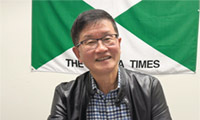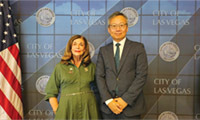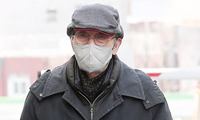A ‘Lost Boy’ Battles AK-47s With Education
▶ Nicholas D. Kristof
Valentino Deng, 37, a former refugee from this town, has returned from America to build a remarkable high school here — with the royalties from “What Is the What,” the best-selling book about him by Dave Eggers.
Valentino, an old friend of mine, says his life was transformed by education and the generosity that people showed him, first in refugee camps and then in America. So now he is paying it forward, and he argues that education is the most potent force to overcome his country’s poverty, tribalism and AK-47s.
“Not everyone had these privileges as I did, so I feel I must not let anyone down,” he says. “There is no better way of sharing the American blessings.”
At night, hyenas cackle beyond his new school’s dormitories, and there’s no Internet or running water. But this boarding school has emerged as one of the best schools in South Sudan, with about 1,000 students from around the nation vying each year for 150 places in the ninth-grade class.
Valentino was a child here in Marial Bai, but a Sudanese militia attacked the area when he was 7 years old. He fled and became one of the legendary Sudanese “Lost Boys” who drifted unaccompanied through endless perils — from land mines to crocodiles — to refugee camps first in Ethiopia and then in Kenya. Valentino saw friends devoured by lions and massacred by soldiers.
But Valentino was blessed as well as cursed. In the normal course of events, he might have ended up herding cattle. Instead, he learned to read and write at a refugee camp school, by scratching letters in the dust with his finger. Then he applied for refugee status in America, and he says he made a pact with God: If you let me get to America, I will use those connections to help my country.
Ultimately, the United States accepted him and he settled in Atlanta in 2001. Increasingly, he decided that what his homeland most lacked was education.
“I was hiding in this bush from someone on horseback shooting, and I had nothing to fight back,” he remembers. “So when I went back I was looking for a solution. And I think the solution is education.”After “What Is the What” came out in 2006, I moderated a panel where Valentino pledged to use the book’s royalties to build a boarding school in his hometown. Then I visited Marial Bai a few years ago and wrote a column; generous Times readers responded with hundreds of thousands of dollars in donations to complete the school and allow it to operate without charging tuition.
Still, the challenges are enormous. Valentino believes that educating girls is crucial to moving away from a culture of warfare, so he was determined to enroll 50 percent girls in the school. At that, he has failed. Only about one-third of the student body is female, even though he accepts almost every girl who applies.
The problem is that in South Sudan, girls’ education just isn’t a priority. In 2010, only 400 girls enrolled in 12th grade in the entire country. Parents often believe that girls should be marrying, not studying.
Susana Ajak Wol Athian, a 10th grader in Valentino’s school who dreams of becoming a doctor, said her parents — who are illiterate — have decided to sell her to be the bride of an uneducated and much older man, for 25 cows. She did not go home on her last vacation for fear that her parents would forcibly hand her over to the man.
“I don’t know him,” she says. “I don’t want to marry him.”Valentino deals with other headaches as well: powerful officials who want their children admitted (he tells them that everything depends on a child’s score in admission exams); teachers who prey on schoolgirls (he fires them); a collapsing economy that creates few jobs (he teaches students to start their own businesses); and surging prices (students cut costs by growing much of their own food, while keeping an eye out in the garden for spitting cobras and black mambas).
Valentino was also appointed last year to be minister of education for Northern Bahr el Ghazal, the state in which his school is located, responsible for 875 public schools in the region. He inherited a plush office, but no plumbing or Internet.
And of course he misses America and its charms. Especially chicken chimichangas.
Yet if South Sudan’s civil war is a reminder of the peril of illiteracy and tribalism, Valentino’s school is a tribute to the power of education and inspiration. Many South Sudanese, after moving to the United States or other countries, ended up returning to their homeland to give back. Their initiatives include the One Tree School Project, Building Minds in South Sudan, Water for South Sudan, Bor College High School, the Sudan Development Foundation and Marol Academy.
One of the most common questions on Facebook and in lectures is how I avoid being overwhelmed and discouraged by the horrors I report on. Sure, the violence can be heartbreaking — a week ago, I reported on South Sudan soldiers raping, castrating and killing children — but for every brutal warlord, there’s a great soul like Valentino struggling to build as others destroy. (For those who want to help Valentino, visit his website, VadFoundation.org.)
Because of this school, I see rays of hope here. The head girl, Victoria Ahok Kuach, says she aims to be the first albino member of Parliament in South Sudan. Dennis Longoben Tulyaba, whose family was displaced by warfare, hopes to be a lawyer. Mary Awet Kuom, whose father was killed in war, has turned down four offers of marriage and seeks to be a doctor.
“Boys and girls are equal,” Mary declared firmly — and then she amended that to make clear that girls are a little more equal. “I can do better than any boy,” she scoffed.
In these kids, I see the same vision as in Valentino that schooling is the best antidote to cruelty, poverty and war.
So congratulations, readers, on what you’ve accomplished here. It’s true that South Sudan is torn apart by atrocities, corruption and famine, but side by side with the worst of humanity, you find the best. In this school, you see refracted a land of hope.
스마터리빙
more [ 건강]
[ 건강]이제 혈관 건강도 챙기자!
[현대해운]우리 눈에 보이지 않기 때문에 혈관 건강을 챙기는 것은 결코 쉽지 않은데요. 여러분은 혈관 건강을 유지하기 위해 어떤 노력을 하시나요?
 [ 건강]
[ 건강]내 몸이 건강해지는 과일궁합
 [ 라이프]
[ 라이프]벌레야 물럿거라! 천연 해충제 만들기
 [ 건강]
[ 건강]혈압 낮추는데 좋은 식품
[현대해운]혈관 건강은 주로 노화가 진행되면서 지켜야 할 문제라고 인식되어 왔습니다. 최근 생활 패턴과 식생활의 변화로 혈관의 노화 진행이 빨라지고
사람·사람들
more
[인터뷰] 멕시코 오지에 세운 ‘희망 진료소’… “관심과 행동이 등불”
멕시코 바하 캘리포니아의 작은 마을 ‘푼타 코로넷(Punta Colonet)’. LA에서 차로 7~8시간 정도 달려야 닿는 이곳에 한인 내과의…

김영완 총영사 LV 방문
김영완 LA 총영사는 지난 11일부터 13일까지 라스베가스(LV)를 방문, 시장 및 주지사실 산하 경제개발청, UNLV 호텔경영대학 등과 잇따…
어흥축제 국악경연대회 해외 참가자 특별 무대
2025 어흥축제가 우천으로 오는 12월12일로 연기된 가운데 이번 축제의 일환으로 예정됐던 미주 국악경연대회의 해외 참가팀 특별무대 행사가 …
[올림픽 골프] 3개 남가주 매장에서 ‘원스톱 골…
올림픽 골프가 추수감사절을 맞아 대규모 골프 용품 세일을 진행한다. 이번 세일은 골프 클럽, 골프백, 의류, 액세서리 등 다양한 골프 관련 제…
[한스전자] 인기 가전제품 최대 2,000달러 할…
한스전자가 연말을 맞아 삼성, LG, 딤채, 프리지데어 등 인기 가전제품을 대상으로 최대 2,000달러 대규모 할인 행사를 진행한다. 이번 행…
많이 본 기사
- 2,000달러 관세 배당금… 내년에 … 1
- “화장실에서 꼭 확인해라”… ‘이런 모양’ 변 계속 나온다면 대장암일 수도
- 관광비자 수수료 인상 185달러서 4… 1
- 하원, ‘엡스타인 파일 공개 법안’ … 1
- 한인 대형교회 전도사 113만불 횡령… 9
- ‘노재팬’ 나선 中 여행객들, 대신 우르르 한국행
- 한덕수 재판 ‘증인 출석’ 거부한 尹…구인영장 집행할까
- 램버트 前 부차관보 “내년 中서 北美회담하려면 러 협조 필요”
- 조현병 나아졌다고 방치하면?… 5년 내 80% 재발 가능성 높아
- “어, 우리 아기 아닌데?” 산후조리원서 신생아 바뀌어 산모 분통
- 아내 ‘냉동인간’ 만들더니 돌연 “혼자살기 적적해”…새 여친 맞은 남편 中서 논란
- 韓-UAE, ‘100년 동행’ 공동선언… ‘바라카모델’ 원전협력 확대
- 월풀, 삼성·LG 국제무역위에 제소… “전자레인지 특허 침해”
- 사우디 빈살만 “1조달러 투자”…7년… 1
- ‘선거구 전쟁’ 공화 조정안, 지방법… 1
- 메타, 인스타·왓츠앱 인수 문제삼은 美정부 반독점 소송 승소
- 한인타운 ‘우후죽순’ 노점상들 버몬트… 2
- 바이브코딩 넘어 바이브워킹…MS, 모든 업무 통합 에이전트 공개
- 뉴욕증시, 엔비디아 실적 ‘D-1’ 기술주 또 팔자…동반 하락
- ‘마라도나 사망 재판’ 판사 해임… “몰래 다큐 촬영 가담”
- 한인 버스기사 살해범, 중범 불체자였… 1
- MS·엔비디아, 앤트로픽과 전략적 파트너십…오픈AI 의존 줄인다
- 트럼프, ‘7년만의 방미’ 사우디 빈살만에 오·만찬 ‘국빈급예우’
- 中, ‘日총리 발언 철회’ 요구에 日 거부… ‘주머니 손 中’ 영상도
- ‘엡스타인 논란’에 입장 돌변 트럼프 “문건 전부 공개하자”
- 정용진, 빈살만 사우디 왕세자 美방문 환영행사 참석
- 트럼프 “엡스타인은 민주당 문제…파일공개법 통과시 서명할것”
- “첨단기술 노린 중국, 미국에 지난 … 1
- 론스타와 ‘13년 국제소송전’ 마침표… ‘배상금 0원’ 완승
- 우편요금 또 오른다 내년초 최고 7.… 1
- 최현우, ‘13억’ 로또 1등 예언 적중에 고소당할 뻔..”당첨금 수령은 노코멘트”[돌싱포맨]
- H 마트, 2026년 탁상용 달력 무료 증정
- ‘곁의 힘: 공감하고 지지하는 곁이 되기’ 포럼
- “트럼프, 지난달 한미정상회담때 핵잠… 2
- KAGRO<중가주한미식품상협회> ‘제31회 장학금 수여식’
- “연말 항공여행 숨통 튀었다”… 항공편 감축 해제
- 오늘도 해결사! 이강인 환상 크로스→이태석 A매치 데뷔골 쾅! 한국, 가나에 1-0 신승 ‘포트2 보인다’
- 형제교회 ‘횡령 사역자’는 성환철 전도사...공동의회 통해 성 전도사 횡령금액과 방법 등 밝혀
- 도요타, 미국 내 하이브리드車 생산 확대… “9억 달러 규모 투자”
- 구글 피차이 “AI 버블 터지면 면역있을 회사 없어”
- 셧다운 기간인 10월 중순에도 실업지표 안정적
- ‘한채영 닮은꼴’ 28기 영숙 “반복되는 오해” 성형 시술 입 열었다
- 사자와 생쥐, 그리고 인간 이야기
- 사우디 빈살만 “1조달러 투자”…7년만의 방미환대 트럼프에 선물
- 대형유통점 홈디포 연간 실적전망 하향… “소비 경고음”
- 갑상선암, 운동과 상관없다더니…10년만에 결과 뒤집혀
- 대한은 다시 살아나는가 1
- LA 총영사관 사칭 보이스피싱 “하루 최고 20건”
- LAX, 최대 공항 3위… 혼잡도 최악
- 버핏, 애플 팔고 구글 대규모 ‘베팅’
1/5지식톡

-
 테슬라 자동차 시트커버 장착
0
테슬라 자동차 시트커버 장착
0테슬라 시트커버, 사놓고 아직 못 씌우셨죠?장착이 생각보다 쉽지 않습니다.20년 경력 전문가에게 맡기세요 — 깔끔하고 딱 맞게 장착해드립니다!장착비용:앞좌석: $40뒷좌석: $60앞·뒷좌석 …
-
 식당용 부탄가스
0
식당용 부탄가스
0식당용 부탄가스 홀세일 합니다 로스앤젤레스 다운타운 픽업 가능 안녕 하세요?강아지 & 고양이 모든 애완동물 / 반려동물 식품 & 모든 애완동물/반려동물 관련 제품들 전문적으로 홀세일/취급하는 회사 입니다 100% …
-
 ACSL 국제 컴퓨터 과학 대회, …
0
ACSL 국제 컴퓨터 과학 대회, …
0웹사이트 : www.eduspot.co.kr 카카오톡 상담하기 : https://pf.kakao.com/_BEQWxb블로그 : https://blog.naver.com/eduspotmain안녕하세요, 에듀스팟입니다…
-
 바디프렌드 안마의자 창고 리퍼브 세…
0
바디프렌드 안마의자 창고 리퍼브 세…
0거의 새제품급 리퍼브 안마의자 대방출 한다고 합니다!8월 23일(토)…24일(일) 단 이틀!특가 판매가Famille: $500 ~ $1,000Falcon: $1,500 ~ $2,500픽업 & 배송직접 픽업 가능LA…
-
 바디프렌드 안마의자 창고 리퍼브 세…
0
바디프렌드 안마의자 창고 리퍼브 세…
0거의 새제품급 리퍼브 안마의자 대방출 한다고 합니다!8월 23일(토)…24일(일) 단 이틀!특가 판매가Famille: $500 ~ $1,000Falcon: $1,500 ~ $2,500픽업 & 배송직접 픽업 가능LA…
케이타운 1번가
오피니언
 노세희 부국장대우·사회부장
노세희 부국장대우·사회부장 대한은 다시 살아나는가
 민경훈 논설위원
민경훈 논설위원사자와 생쥐, 그리고 인간 이야기
 한형석 사회부 부장대우
한형석 사회부 부장대우 한인타운 교통 인프라 개선 기대
 박영실 시인·수필가
박영실 시인·수필가 [화요칼럼] 말의 위력
 양홍주 / 한국일보 논설위원
양홍주 / 한국일보 논설위원 [지평선] 외국어 공부와 장수
 이상국
이상국 ‘도반(道伴)’
 옥세철 논설위원
옥세철 논설위원러시아제국 부활의 꿈은 멀어져만 가고…

폭발 직전의 상황인가?
 메건 매카들 워싱턴포스트 칼럼니스트 / CNN ‘GPS’ 호스트
메건 매카들 워싱턴포스트 칼럼니스트 / CNN ‘GPS’ 호스트 [메건 매카들 칼럼] 지나간 시대의 낙관주의
1/3지사별 뉴스

‘네이버 플러스’호스피스 자원봉사자 31명 배출
뉴저지 팰리세이즈팍에 위치한 비영리단체‘네이버 플러스’(Neighbor Plus·이사장 양춘길 목사)가 말기암 환자와 그 가족들을 돌보는 제4…
회장선거(뉴저지한인회) 놓고 내분사태 ‘악화일로’

“워싱턴교협 50년, 다음세대에 방향 제시하는 좌표”
“구슬이 서 말이라도 꿰어야 보배라는 말이 있다. 구슬을 꿰어 보배를 만들어 낸 편찬위원회에 감사하고, 지난 50년간 그 구슬을 만들어낸 여러…
장학생 20명 선정…장학금 총 3만불

사우디 빈살만 “1조달러 투자”…7년만의 방미환대 트럼프에 선물
사우디아라비아가 18일 대미 투자액을 기존에 발표했던 6천억 달러(약 876조원)에서 1조 달러(약 1천460조원) 규모로 상향 조정하기로 했…
방한후 美입국했다 석연찮게 구금된 한인과학자, 4개월만에 석방

오늘 하루 이 창 열지 않음 닫기 

















































.png)


댓글 안에 당신의 성숙함도 담아 주세요.
'오늘의 한마디'는 기사에 대하여 자신의 생각을 말하고 남의 생각을 들으며 서로 다양한 의견을 나누는 공간입니다. 그러나 간혹 불건전한 내용을 올리시는 분들이 계셔서 건전한 인터넷문화 정착을 위해 아래와 같은 운영원칙을 적용합니다.
자체 모니터링을 통해 아래에 해당하는 내용이 포함된 댓글이 발견되면 예고없이 삭제 조치를 하겠습니다.
불건전한 댓글을 올리거나, 이름에 비속어 및 상대방의 불쾌감을 주는 단어를 사용, 유명인 또는 특정 일반인을 사칭하는 경우 이용에 대한 차단 제재를 받을 수 있습니다. 차단될 경우, 일주일간 댓글을 달수 없게 됩니다.
명예훼손, 개인정보 유출, 욕설 등 법률에 위반되는 댓글은 관계 법령에 의거 민형사상 처벌을 받을 수 있으니 이용에 주의를 부탁드립니다.
Close
x